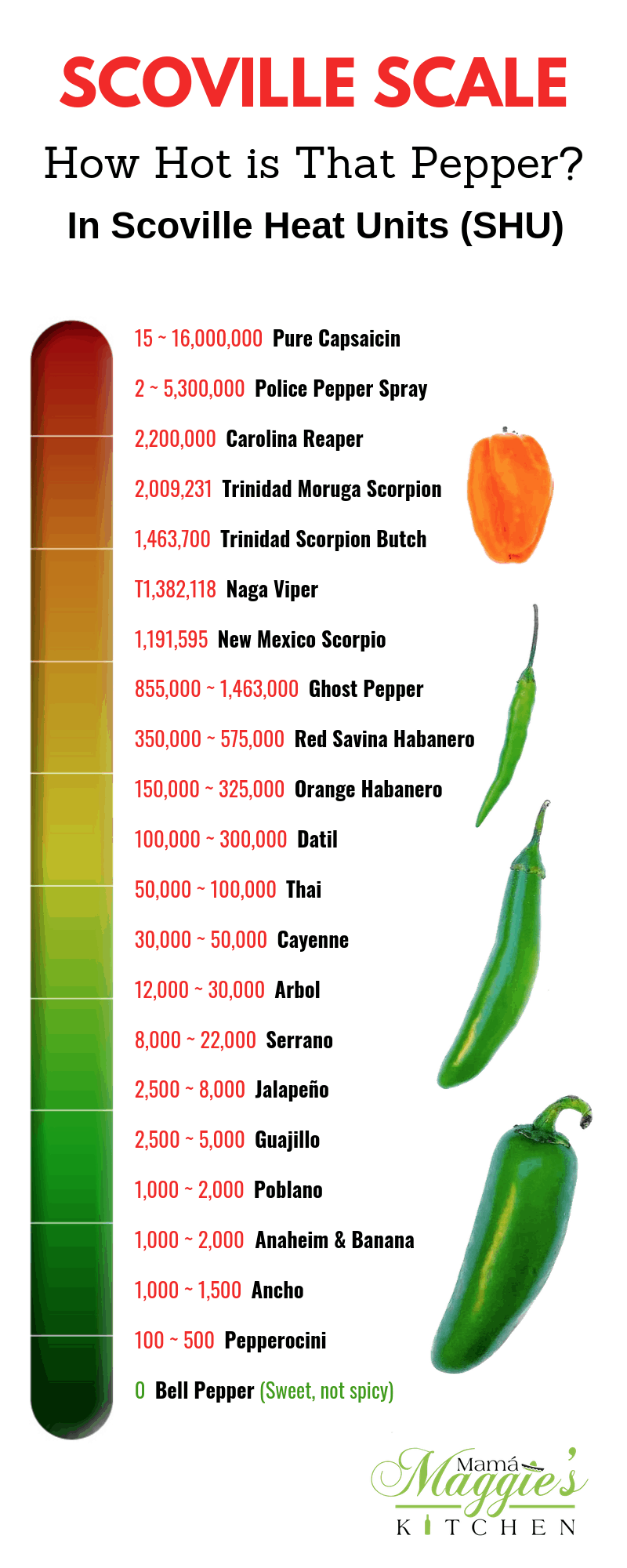
Scoville Scale How Hot Is that Pepper? Mamá Maggie's Kitchen
Scotch BonnetSHUs: 100,000-350,000. Ranging from 100,000 to 3,500 scoville heat units, even the mildest Scotch Bonnet is over 12 times hotter than the spiciest jalapeño. That's why in Guyana it's called 'Ball of Fire.'. It's native to the Caribbean, but is now grown in parts of Africa, Florida and South America.

Scoville Sauces Hot Sauce Ranking, Scoville Sauces, William Scoville And More Chili Pepper News
The habanero pepper ranges from 100,000 to 350,000 Scoville heat units, pairing it with its very close relative, the scotch bonnet pepper. In terms of eating heat, that's around 76 times hotter than an average jalapeño. At the extremes (the mildest jalapeño vs. the hottest habanero) it's a whopping 140 times hotter.

Chiles en la escala Scoville Escala scoville, Recetas de platillos mexicanos, Chile
Cobanero Chilies. Cobanero chilies (also sometimes called Coban chilis) are a small conical shaped fruit that typically only grows to one inch in length. (The cobanero's size is similar to that of a piquin pepper.) On the vine, the chili slowly turns to its red tone after it is allowed to mature. The chili can be eaten raw just like you would.
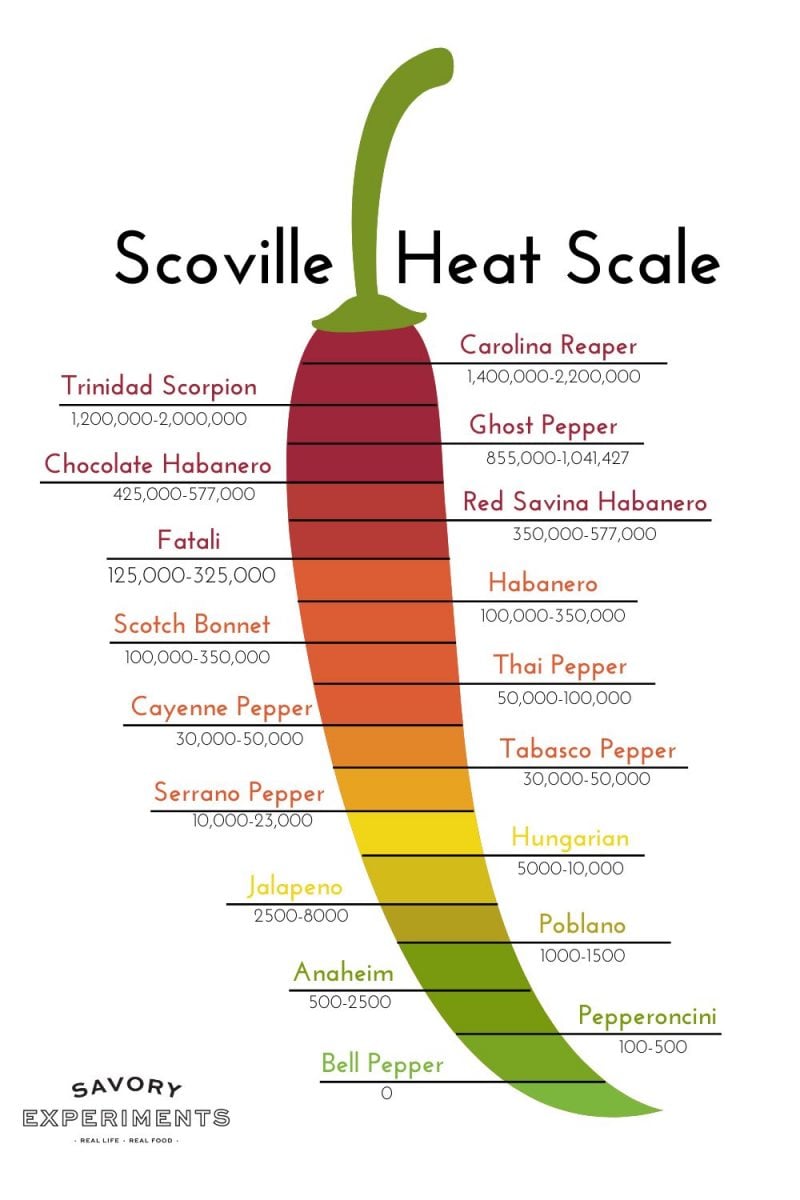
The Scoville Scale For Chili Peppers Can you Handle the Heat?
The Carbonero chili is a cross between a Bhut Carbon and a Habanero and is correspondingly hot with a delicious fruity flavour.. Scoville: 50,000 - 100,000 SHU: optimal germination temperature: 22 - 28 °C: Sowing: Feb. - Apr. Flowers: white (May-August) Plant growth habit: bushy, approx. 80 cm in height:
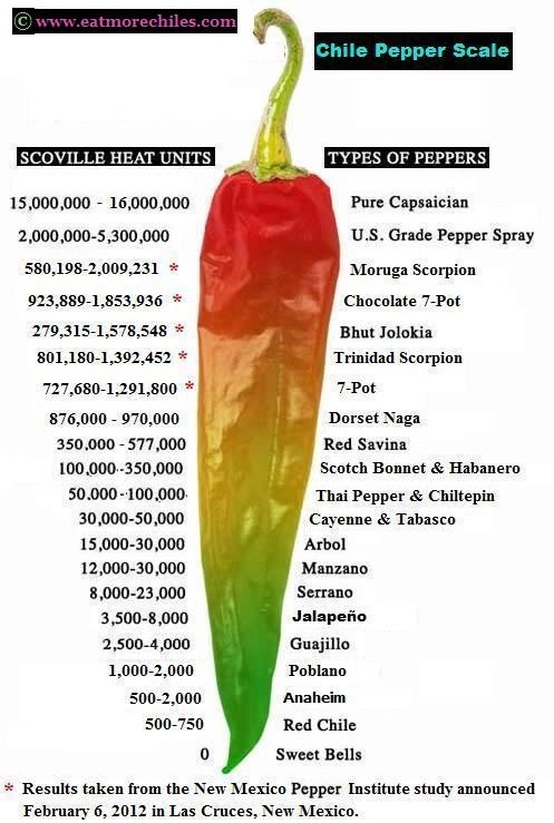
Scoville Scale Mike's Hot Pepper's
Scoville Scale for Some of the Most Common Chili Peppers and Hot Sauces. Here is a list of Scoville Heat Units (SHU) of the most common chili peppers and hot sauces so you can get an understanding of how they relate to each other. Bell Pepper - 0 SHU. Banana Peppers - 0 - 500 SHU. Shishito Peppers - 50 - 200 SHU.
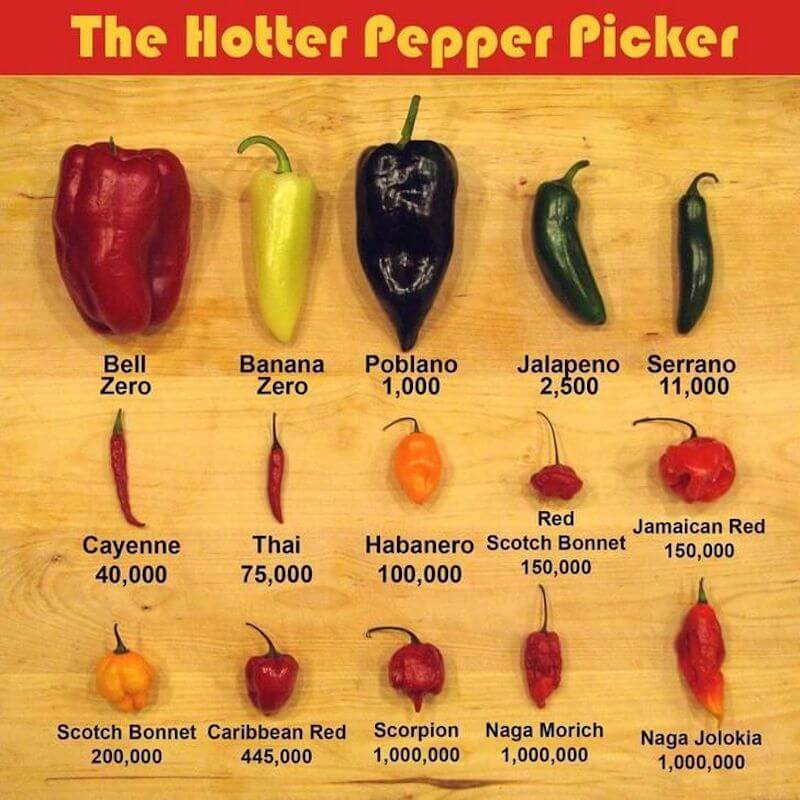
The Scoville Index for Peppers A Guide to Heat Levels
The Scoville scale exists since 1912 and was invented by the American pharmacologist Wilbur Scoville. It serves to determine the degree of pungency of fruits of the genus Capsicum, which includes peppers and chilis. The Scoville scale was originally based on the so-called Scoville Organoleptic Test developed by Wilbur Scoville.

Carbonero Chilisamen bestellen
The Naga Morich, with around 1 million SHU, [2] is primarily found in Bangladesh. The Scoville scale is a measurement of pungency (spiciness or "heat") of chili peppers and other substances, recorded in Scoville heat units (SHU). It is based on the concentration of capsaicinoids, among which capsaicin is the predominant component.
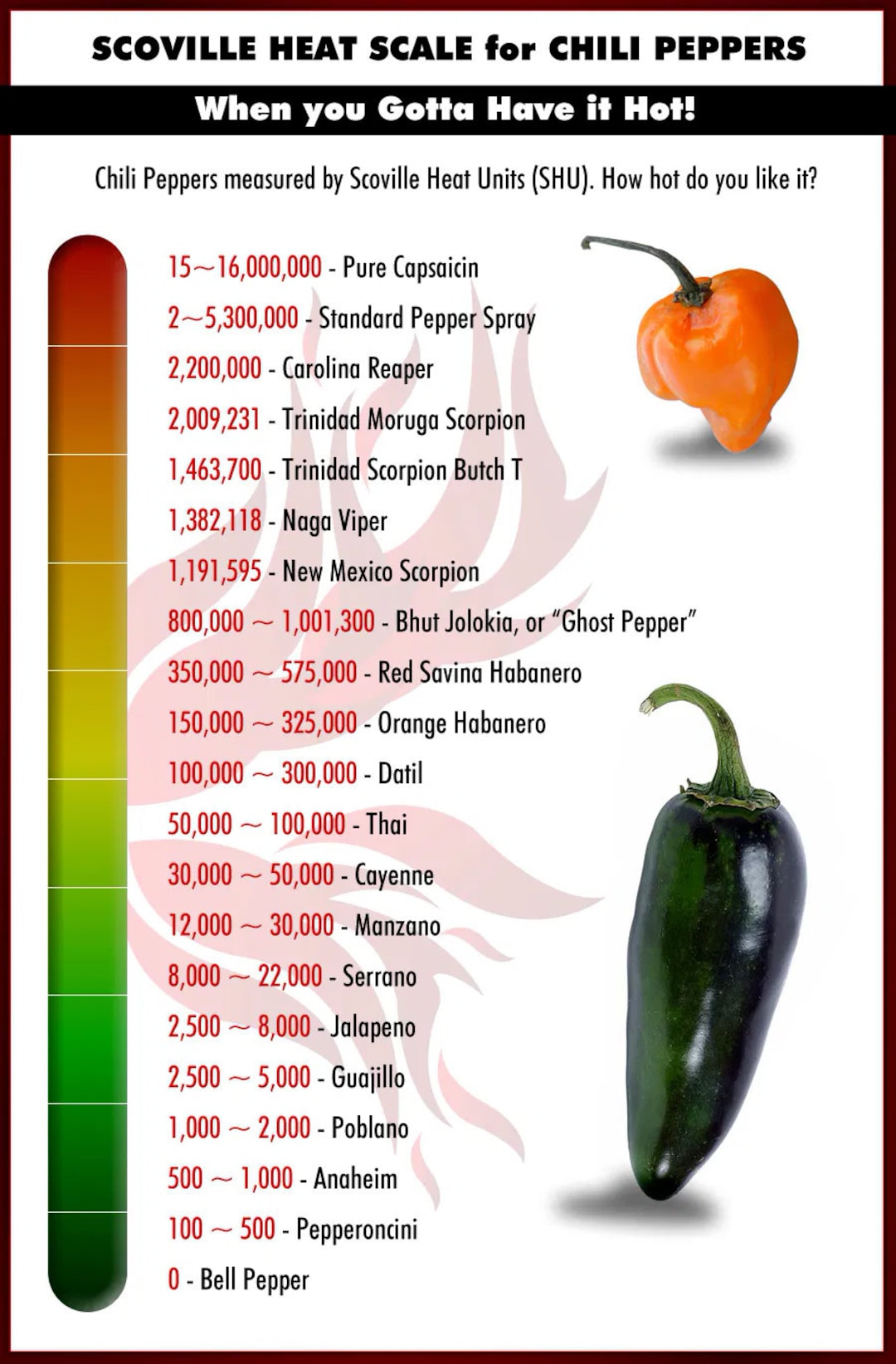
A List of Chili Peppers and Their Scoville Heat Units shus Etsy
Chillies are measured using the Scoville scale, which is a measurement of the level of capsaicin in spicy foods. The scale was named after its creator, American pharmacist Wilbur Scoville, who devised the method in 1912. Capsaicin stimulates the nerve endings in the mouth and throat, which sends a message to the brain that the body is.
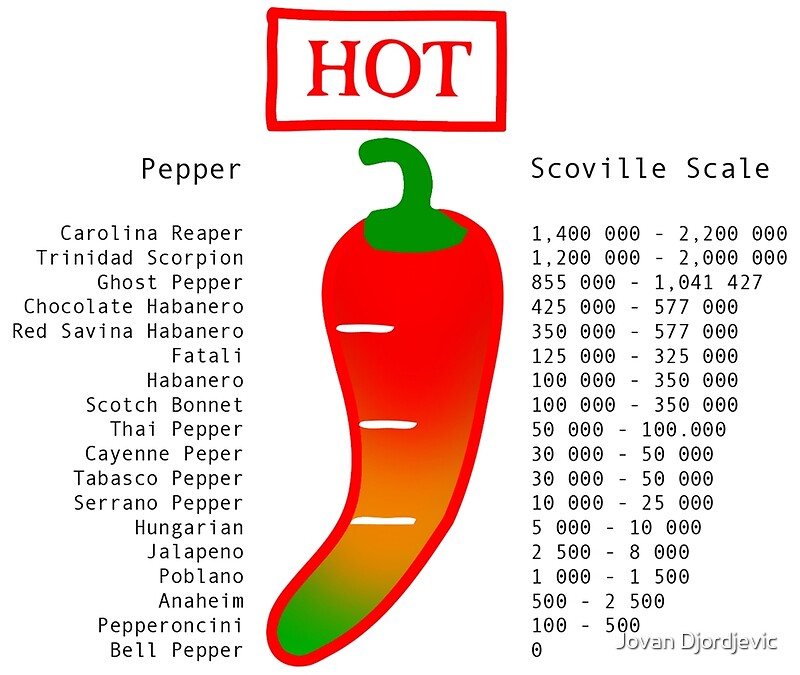
Bird's Eye Chili Scoville Scale All information about healthy recipes and cooking tips
The Scoville scale rates the spiciness of peppers through the measurement of capsaicin levels. Created by Wilbur Scoville, the unit of measurement is the Scoville Heat Unit (SHU), and chili peppers range from 0 SHUs (bell pepper) to over 2 million SHUs (Carolina Reaper).. There are thousands of different pepper varieties around the world, with more being created every year through plant breeding.

Carbonero Chilli Seeds from The Hippy Seed Company
What are Calabrian peppers? Calabrian peppers are a medium-hot chili (25,000 to 40,000 Scoville heat units) that are named after their region of origin, Calabria in Southern Italy. Its flavor is unique and a big part of this pepper's charm: smoky, fruity, and a touch salty. It's a popular chili for Italian cuisine, but its usage goes well.

Chile Pepper Heat (Scoville) Scale A Guide To The Spiciest Capsicums from mild… in 2019
The Scoville Scale is a system for rating the spiciness of chili peppers and spicy foods, developed by Wilbur Scoville in 1912. It measures heat based on capsaicin content, ranging from 0 (no heat) to 16 million (pure capsaicin). Most peppers fall within the 100-500 Scoville Unit range, while well-known ones like jalapeños and serranos range.

The Scoville Heat Scale Chilli Pepper List ChilliBOM
0. Bell Pepper. 0. Italian Sweet Pepper. 0. Melrose Pepper. 0. The most complete, easy to use, searchable, sortable list of over 400 hot peppers and their scoville scale (SHU). Includes links for more info and photos.

Scoville Heat Scale For Chili Peppers Poster ubicaciondepersonas.cdmx.gob.mx
Sie dient der Bestimmung des Schärfegrads von Früchten der Gattung Capsicum, zu der Paprika und Chilis gehören. Ursprünglich basiert die Scoville Skala auf dem von Wilbur Scoville entwickelten, sogenannten Scoville Organoleptic Test. Hierbei wurde eine Probe einer Chili zubereitet und immer wieder mit Wasser verdünnt, bis die Testprobanden.

What Is The Scoville Scale For Peppers? Grow Hot Peppers
Scoville units or SHUs for each chilli can change wildly based on climate, growing conditions and even the seed. Pepper Name. Scoville Heat Units. Pure Capsaicin. 16000000 SHUs. Police Grade Pepper Spray. 5300000 SHUs. Trinidad Moruga Scorpion. 2009231 SHUs.
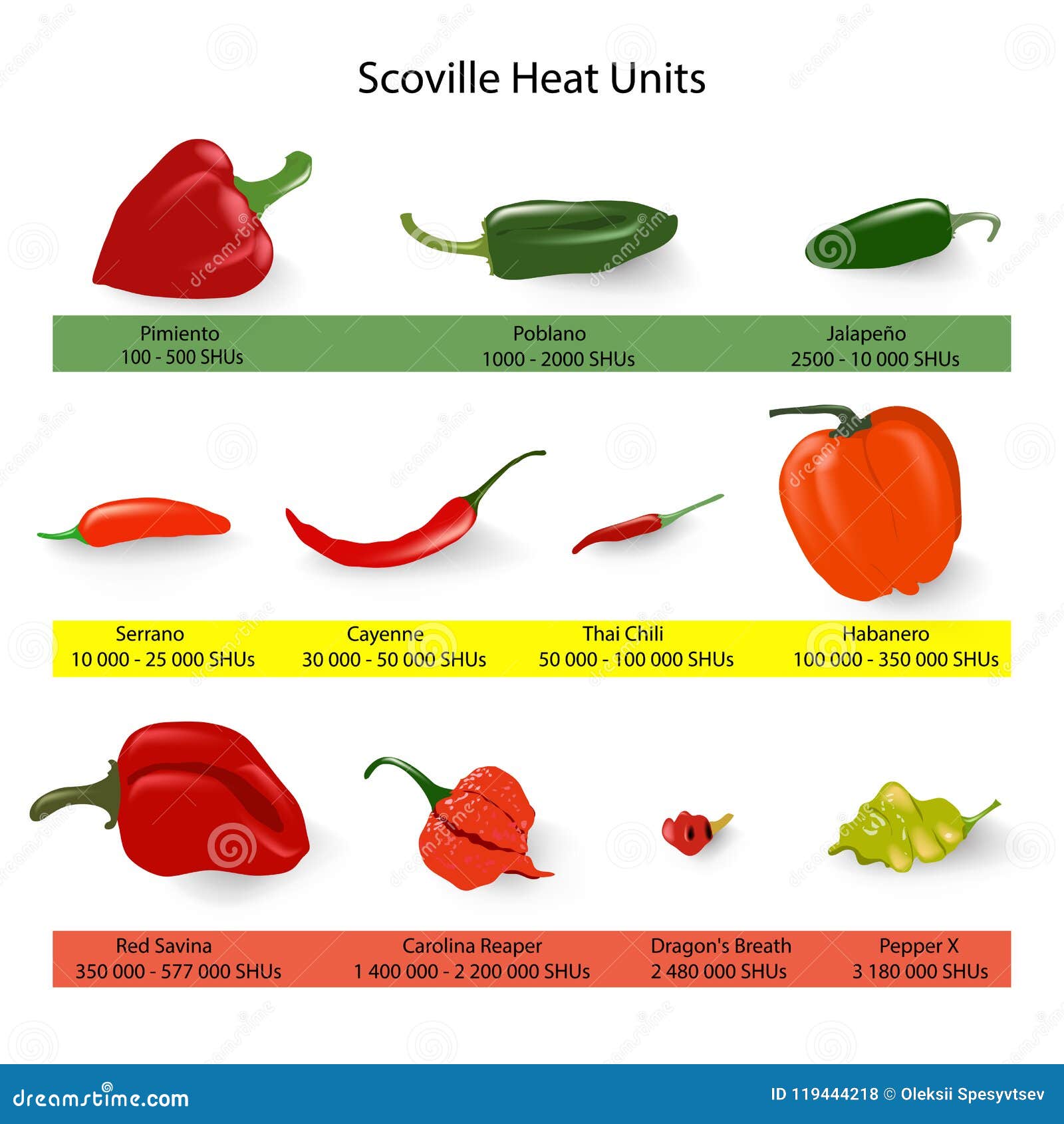
Sale > pepper scoville level > in stock
Natural. The Bhut Jolokia is endemic to the north eastern states of Assam, Nagaland and Manipur in India. In 2007, it was recognized by the Guinness Book of World Records as the hottest chili pepper in the world. A title it lost to the infinite pepper in 2011. The pepper has recorded Scoville ratings of over 1 million.
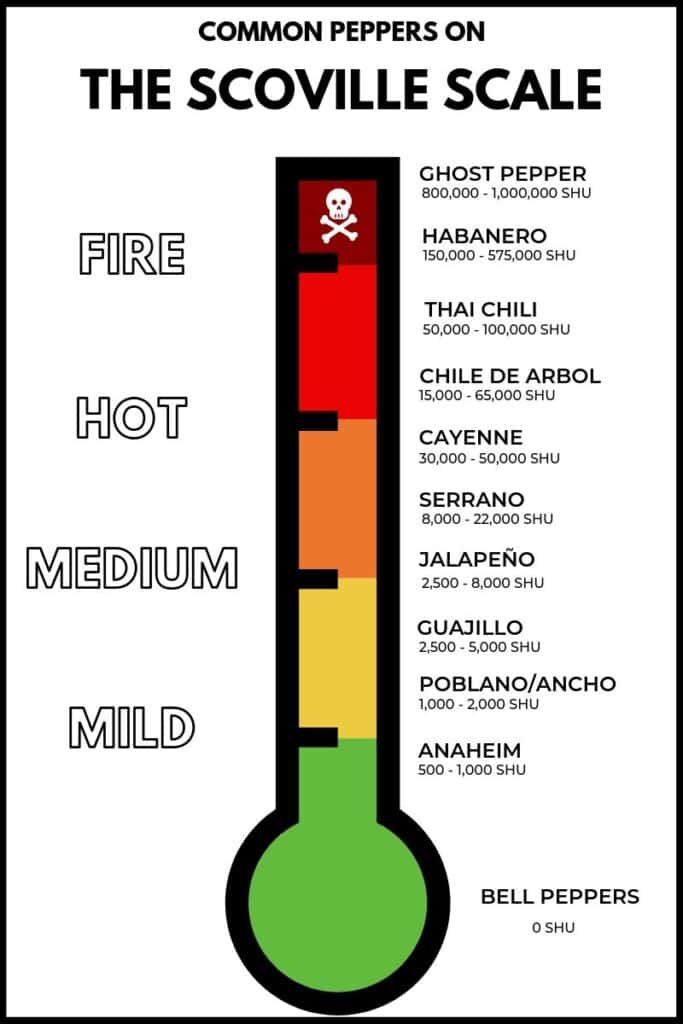
The Scoville Scale A Guide to Hot Peppers Isabel Eats
Hot Pepper Scale in Scoville Units. On the Scoville scale, different pepper varieties are categorized into heat ratings, with 0 being the mildest and 12 representing the highest heat. Santaka, Pequin, Super Chile, Santaka, Cayenne, Tobasco, Aji, Jaloro. Red Savina Habanero, Chocolate Habanero, Indian Tezpur, Scotch Bonnet, Orange Habanero.